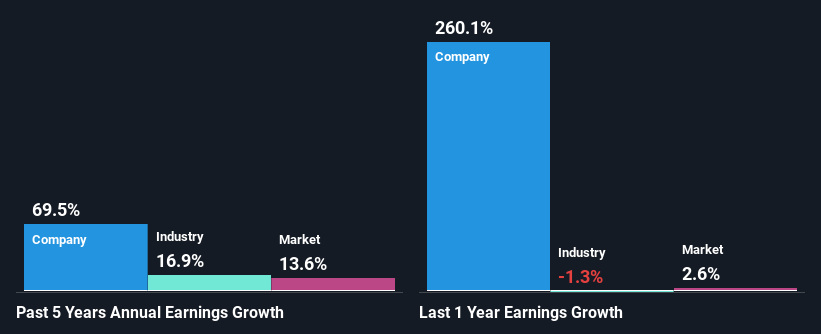- Sweden
- /
- Professional Services
- /
- OM:NJOB
NetJobs Group AB (publ)'s (STO:NJOB) Stock Is Going Strong: Is the Market Following Fundamentals?

NetJobs Group's (STO:NJOB) stock is up by a considerable 52% over the past three months. Given that the market rewards strong financials in the long-term, we wonder if that is the case in this instance. Specifically, we decided to study NetJobs Group's ROE in this article.
Return on equity or ROE is a key measure used to assess how efficiently a company's management is utilizing the company's capital. Simply put, it is used to assess the profitability of a company in relation to its equity capital.
View our latest analysis for NetJobs Group
How Do You Calculate Return On Equity?
The formula for ROE is:
Return on Equity = Net Profit (from continuing operations) ÷ Shareholders' Equity
So, based on the above formula, the ROE for NetJobs Group is:
74% = kr9.1m ÷ kr12m (Based on the trailing twelve months to June 2024).
The 'return' is the amount earned after tax over the last twelve months. One way to conceptualize this is that for each SEK1 of shareholders' capital it has, the company made SEK0.74 in profit.
Why Is ROE Important For Earnings Growth?
Thus far, we have learned that ROE measures how efficiently a company is generating its profits. Based on how much of its profits the company chooses to reinvest or "retain", we are then able to evaluate a company's future ability to generate profits. Assuming everything else remains unchanged, the higher the ROE and profit retention, the higher the growth rate of a company compared to companies that don't necessarily bear these characteristics.
NetJobs Group's Earnings Growth And 74% ROE
Firstly, we acknowledge that NetJobs Group has a significantly high ROE. Additionally, the company's ROE is higher compared to the industry average of 30% which is quite remarkable. Under the circumstances, NetJobs Group's considerable five year net income growth of 69% was to be expected.
Next, on comparing with the industry net income growth, we found that NetJobs Group's growth is quite high when compared to the industry average growth of 17% in the same period, which is great to see.

The basis for attaching value to a company is, to a great extent, tied to its earnings growth. What investors need to determine next is if the expected earnings growth, or the lack of it, is already built into the share price. Doing so will help them establish if the stock's future looks promising or ominous. If you're wondering about NetJobs Group's's valuation, check out this gauge of its price-to-earnings ratio, as compared to its industry.
Is NetJobs Group Efficiently Re-investing Its Profits?
NetJobs Group doesn't pay any regular dividends to its shareholders, meaning that the company has been reinvesting all of its profits into the business. This is likely what's driving the high earnings growth number discussed above.
Summary
In total, we are pretty happy with NetJobs Group's performance. In particular, it's great to see that the company is investing heavily into its business and along with a high rate of return, that has resulted in a sizeable growth in its earnings. If the company continues to grow its earnings the way it has, that could have a positive impact on its share price given how earnings per share influence long-term share prices. Not to forget, share price outcomes are also dependent on the potential risks a company may face. So it is important for investors to be aware of the risks involved in the business. To know the 4 risks we have identified for NetJobs Group visit our risks dashboard for free.
Valuation is complex, but we're here to simplify it.
Discover if NetJobs Group might be undervalued or overvalued with our detailed analysis, featuring fair value estimates, potential risks, dividends, insider trades, and its financial condition.
Access Free AnalysisHave feedback on this article? Concerned about the content? Get in touch with us directly. Alternatively, email editorial-team (at) simplywallst.com.
This article by Simply Wall St is general in nature. We provide commentary based on historical data and analyst forecasts only using an unbiased methodology and our articles are not intended to be financial advice. It does not constitute a recommendation to buy or sell any stock, and does not take account of your objectives, or your financial situation. We aim to bring you long-term focused analysis driven by fundamental data. Note that our analysis may not factor in the latest price-sensitive company announcements or qualitative material. Simply Wall St has no position in any stocks mentioned.
About OM:NJOB
NetJobs Group
Owns and operates digital platforms and services for job advertising and employer branding primarily in Sweden, Germany, and internationally.
Flawless balance sheet with solid track record.


